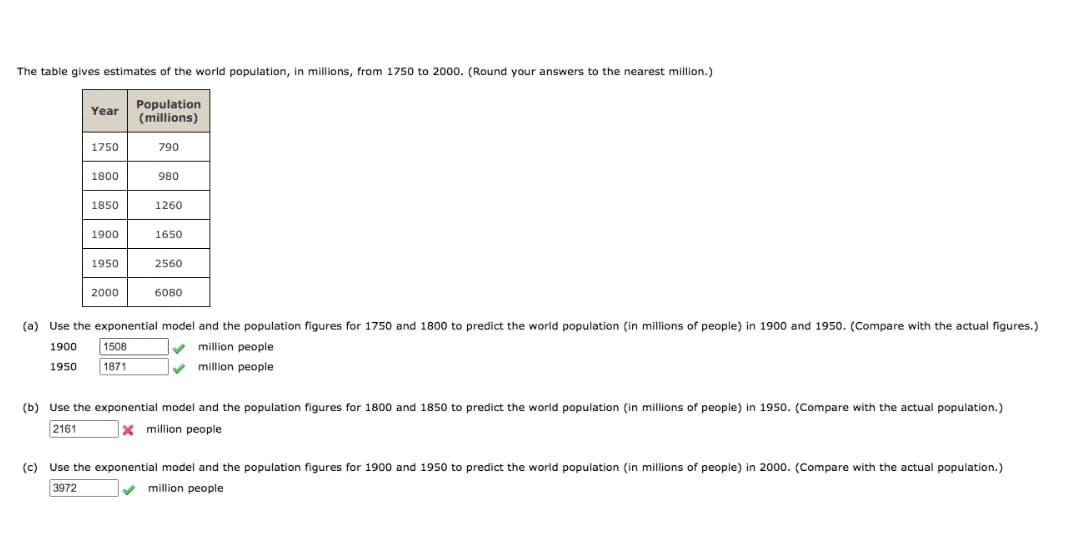The table gives estimates of the world population, in millions, from 1750 to 2000. (Round your answers to the nearest million.) Population (millions) Year 1750 790 1800 980 1850 1260 1900 1650 1950 2560 2000 6080 (a) Use the exponential model and the population figures for 1750 and 1800 to predict the world population (in millions of people) in 1900 and 1950. (Compare with the actual figures 1900 1508 million people 1950 1871 v million people (b) Use the exponential model and the population figures for 1800 and 1850 to predict the world population (in millions of people) in 1950. (Compare with the actual population.) 2161 x million people
The table gives estimates of the world population, in millions, from 1750 to 2000. (Round your answers to the nearest million.) Population (millions) Year 1750 790 1800 980 1850 1260 1900 1650 1950 2560 2000 6080 (a) Use the exponential model and the population figures for 1750 and 1800 to predict the world population (in millions of people) in 1900 and 1950. (Compare with the actual figures 1900 1508 million people 1950 1871 v million people (b) Use the exponential model and the population figures for 1800 and 1850 to predict the world population (in millions of people) in 1950. (Compare with the actual population.) 2161 x million people
Algebra and Trigonometry (MindTap Course List)
4th Edition
ISBN:9781305071742
Author:James Stewart, Lothar Redlin, Saleem Watson
Publisher:James Stewart, Lothar Redlin, Saleem Watson
Chapter4: Exponential And Logarithmic Functions
Section4.FOM: Focus On Modeling: Fitting Exponential And Power Curves To Data
Problem 1P: U.S. Population The U.S. Constitution requires a census every 10 years. The census data for 17902010...
Related questions
Question
The table gives estimates of the world population, in millions, from 1750 to 2000. (Round your answers to the nearest million.)

Transcribed Image Text:The table gives estimates of the world population, in millions, from 1750 to 2000. (Round your answers to the nearest million.)
Population
(millions)
Year
1750
790
1800
980
1850
1260
1900
1650
1950
2560
2000
6080
(a) Use the exponential model and the population figures for 1750 and 1800 to predict the world population (in millions of people) in 1900 and 1950. (Compare with the actual figures.)
1900
1508
million people
1950
1871
V million people
(b) Use the exponential model and the population figures for 1800 and 1850 to predict the world population (in millions of people) in 1950. (Compare with the actual population.)
2161
x million people
(c) Use the exponential model and the population figures for 1900 and 1950 to predict the world population (in millions of people) in 2000. (Compare with the actual population.)
3972
million people
Expert Solution
This question has been solved!
Explore an expertly crafted, step-by-step solution for a thorough understanding of key concepts.
This is a popular solution!
Trending now
This is a popular solution!
Step by step
Solved in 2 steps with 1 images

Knowledge Booster
Learn more about
Need a deep-dive on the concept behind this application? Look no further. Learn more about this topic, advanced-math and related others by exploring similar questions and additional content below.Recommended textbooks for you

Algebra and Trigonometry (MindTap Course List)
Algebra
ISBN:
9781305071742
Author:
James Stewart, Lothar Redlin, Saleem Watson
Publisher:
Cengage Learning

College Algebra
Algebra
ISBN:
9781305115545
Author:
James Stewart, Lothar Redlin, Saleem Watson
Publisher:
Cengage Learning

Algebra & Trigonometry with Analytic Geometry
Algebra
ISBN:
9781133382119
Author:
Swokowski
Publisher:
Cengage

Algebra and Trigonometry (MindTap Course List)
Algebra
ISBN:
9781305071742
Author:
James Stewart, Lothar Redlin, Saleem Watson
Publisher:
Cengage Learning

College Algebra
Algebra
ISBN:
9781305115545
Author:
James Stewart, Lothar Redlin, Saleem Watson
Publisher:
Cengage Learning

Algebra & Trigonometry with Analytic Geometry
Algebra
ISBN:
9781133382119
Author:
Swokowski
Publisher:
Cengage

Functions and Change: A Modeling Approach to Coll…
Algebra
ISBN:
9781337111348
Author:
Bruce Crauder, Benny Evans, Alan Noell
Publisher:
Cengage Learning

Glencoe Algebra 1, Student Edition, 9780079039897…
Algebra
ISBN:
9780079039897
Author:
Carter
Publisher:
McGraw Hill